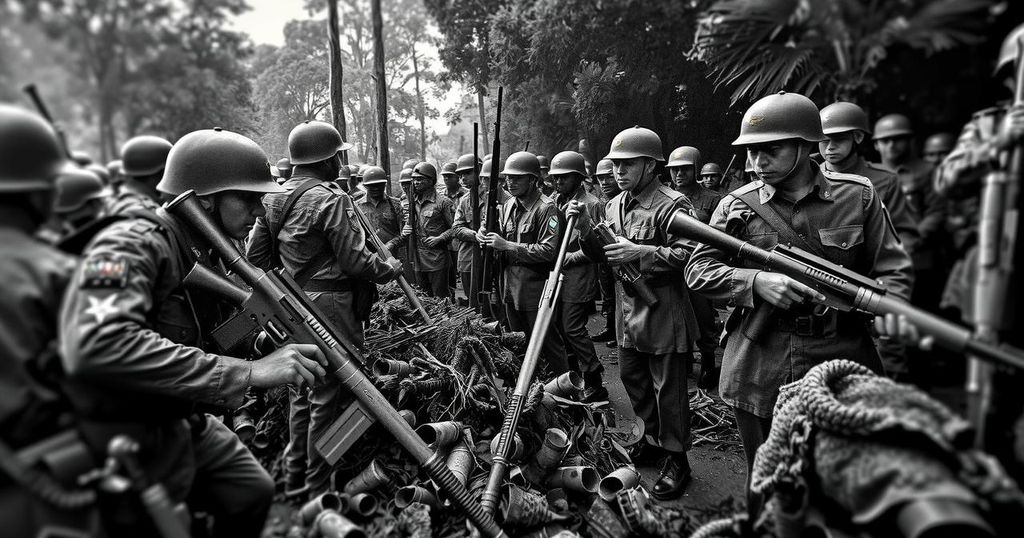Global news
ASIA, DUTCH EAST INDIES, EAST, EUROPE, EXTREMISM, HUMAN RIGHTS, HUMAN RIGHTS VIOLATIONS, INDONESIA, INTERNATIONAL LAW, NETHERLANDS, NETHERLANDS INSTITUTE FOR MILITARY HISTORY, NIOD INSTITUTE FOR WAR, REPUBLIC OF INDONESIA, ROYAL INSTITUTE FOR LANGUAGE, LAND, AND ETHNOLOGY, SECURITY
Fatima Khan
0 Comments
Dutch Government’s Complicity in Military Brutality During Indonesia’s Independence War
A report reveals that the Dutch government tolerated systemic violence by its military during the Indonesian independence war, contradicting earlier claims of isolated incidents. The investigation exposes the extent of such brutality, which was justified to suppress Indonesian independence efforts, and highlights the complicity of various state authorities in allowing this violence to occur.
A recently conducted study has unveiled that the Dutch government and military leadership knowingly allowed the systematic and extreme violence inflicted by Dutch forces during the Indonesian independence war from 1945 to 1949. The report, commissioned by notable institutes such as the Royal Institute for Language, Land, and Ethnology and the Netherlands Institute for Military History, challenges previous assertions that suggested isolated incidents of violence. Researchers argue that political, military, and judicial authorities consciously permitted this brutality to suppress the Indonesian independence movement, believing it necessary to reassert control over the former Dutch East Indies.
The investigators highlighted the campaigns of extreme violence employed by Dutch soldiers, which included extrajudicial killings, mass arrests, and the destruction of villages. This pervasive brutality emanated from a colonial mindset, with Dutch officials underestimating Indonesian aspirations for independence and dismissing the Republic as a transient entity. Furthermore, military courts often overlooked or justified the violence, leading to a culture of impunity and an unwillingness to acknowledge the extent of the state’s complicity in such actions.
The report’s findings reveal a disconnection between the military’s actions and the societal perception in the Netherlands, where there was considerable support for military interventions. Critics, including members of the Committee of Dutch Debts of Honor, have voiced concerns over the lack of direct accountability termed as “war crimes”. Conversely, the Veterans Platform has expressed disappointment at what it perceives as a one-sided portrayal of Dutch veterans, arguing that the study fails to adequately address the complexities of the conflict, including the violence exerted by Indonesian guerrillas.
The examination of the Dutch military’s actions during the Indonesian independence war is critical to understanding the broader implications of colonial violence and the formation of national identity. Following Japan’s occupation of Dutch East Indies during World War II, Indonesia proclaimed independence on August 17, 1945. The subsequent conflict saw attempts by the Netherlands to reclaim its former colony, leading to widespread violence and numerous human rights violations. Previous narratives downplayed systematic violence, which this study challenges by highlighting the collusion between military and governmental bodies that permitted such acts. This research is pivotal as it sheds light on the accountability of colonial powers in their historical engagements and their lingering effects on post-colonial societies.
In conclusion, the study underscores the systemic nature of violence employed by Dutch military forces during the Indonesian independence war, revealing a deliberate tolerance of brutality sanctioned by the state. The failure to fully acknowledge this history hampers the necessary discourse surrounding colonial accountability and presents a challenge for future generations to address the legacies of colonialism. The divergent perspectives from various stakeholders, including veterans and human rights advocates, highlight the complexities inherent in reconciling historical narratives with contemporary interpretations of justice and accountability.
Original Source: nltimes.nl




Post Comment